Comprehensive Analysis of the UK Luxury Hotel Market (Report)
VerifiedAdded on 2023/01/17
|13
|4519
|94
Report
AI Summary
This report provides a comprehensive analysis of the luxury hotel market in the UK. It begins with an introduction to the hospitality industry and the definition of luxury hotels, highlighting key players like Marriott and IHG. The report then delves into a PESTLE analysis, examining the political, economic, social, technological, legal, and environmental factors impacting the industry. It assesses the current economic conditions in the UK, including the impact of Brexit and tourism. Furthermore, the report analyzes key issues such as changing consumer expectations, technological advancements, labor shortages, and booking/revenue challenges. Porter's Five Forces model is applied to assess the competitive landscape, followed by an analysis of key players like IHG and Hilton. The report concludes by identifying opportunities and threats within the industry and speculating on future scenarios, offering a detailed understanding of the UK luxury hotel market.
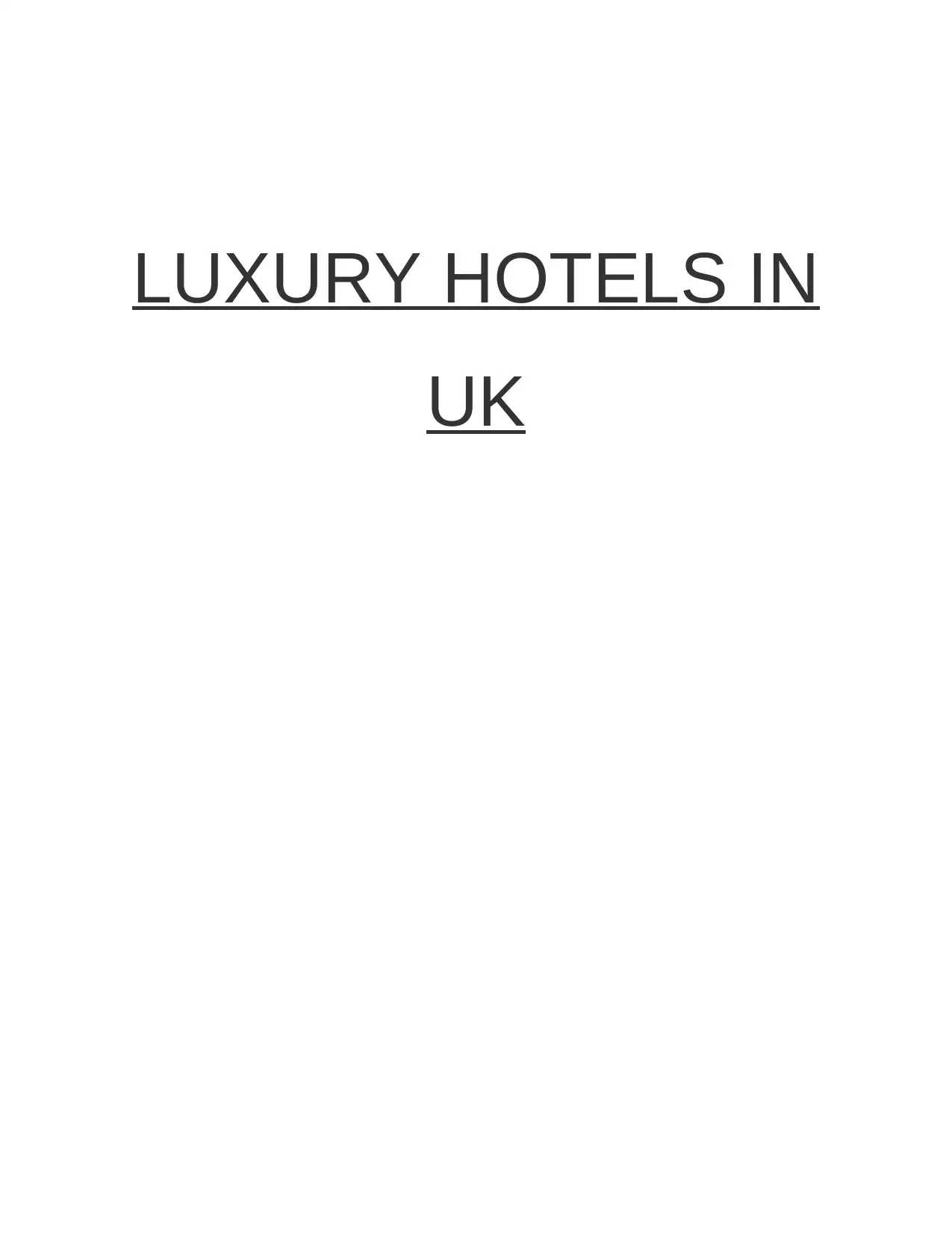
LUXURY HOTELS IN
UK
UK
Paraphrase This Document
Need a fresh take? Get an instant paraphrase of this document with our AI Paraphraser
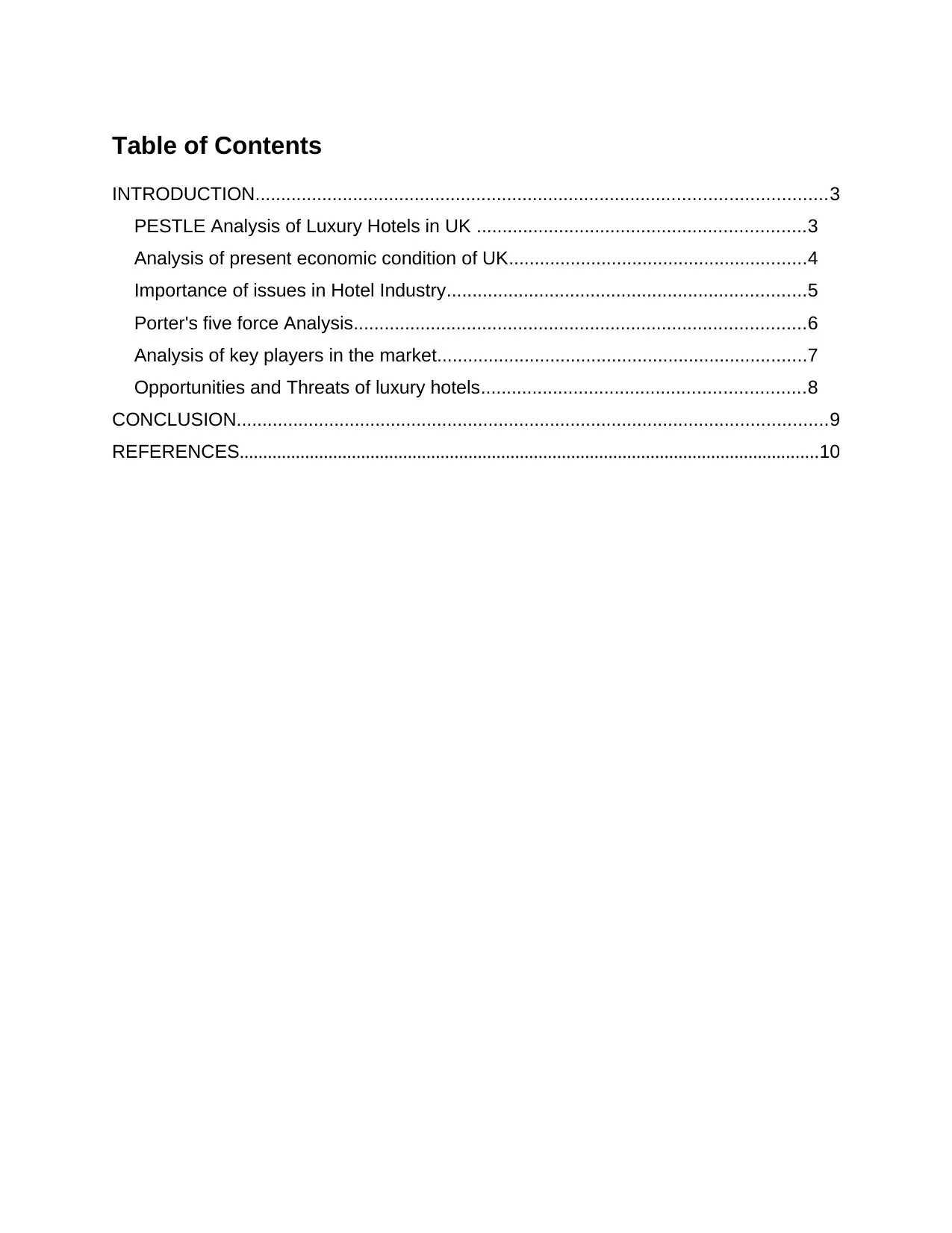
Table of Contents
INTRODUCTION...............................................................................................................3
PESTLE Analysis of Luxury Hotels in UK ................................................................3
Analysis of present economic condition of UK..........................................................4
Importance of issues in Hotel Industry......................................................................5
Porter's five force Analysis........................................................................................6
Analysis of key players in the market........................................................................7
Opportunities and Threats of luxury hotels...............................................................8
CONCLUSION...................................................................................................................9
REFERENCES............................................................................................................................10
INTRODUCTION...............................................................................................................3
PESTLE Analysis of Luxury Hotels in UK ................................................................3
Analysis of present economic condition of UK..........................................................4
Importance of issues in Hotel Industry......................................................................5
Porter's five force Analysis........................................................................................6
Analysis of key players in the market........................................................................7
Opportunities and Threats of luxury hotels...............................................................8
CONCLUSION...................................................................................................................9
REFERENCES............................................................................................................................10
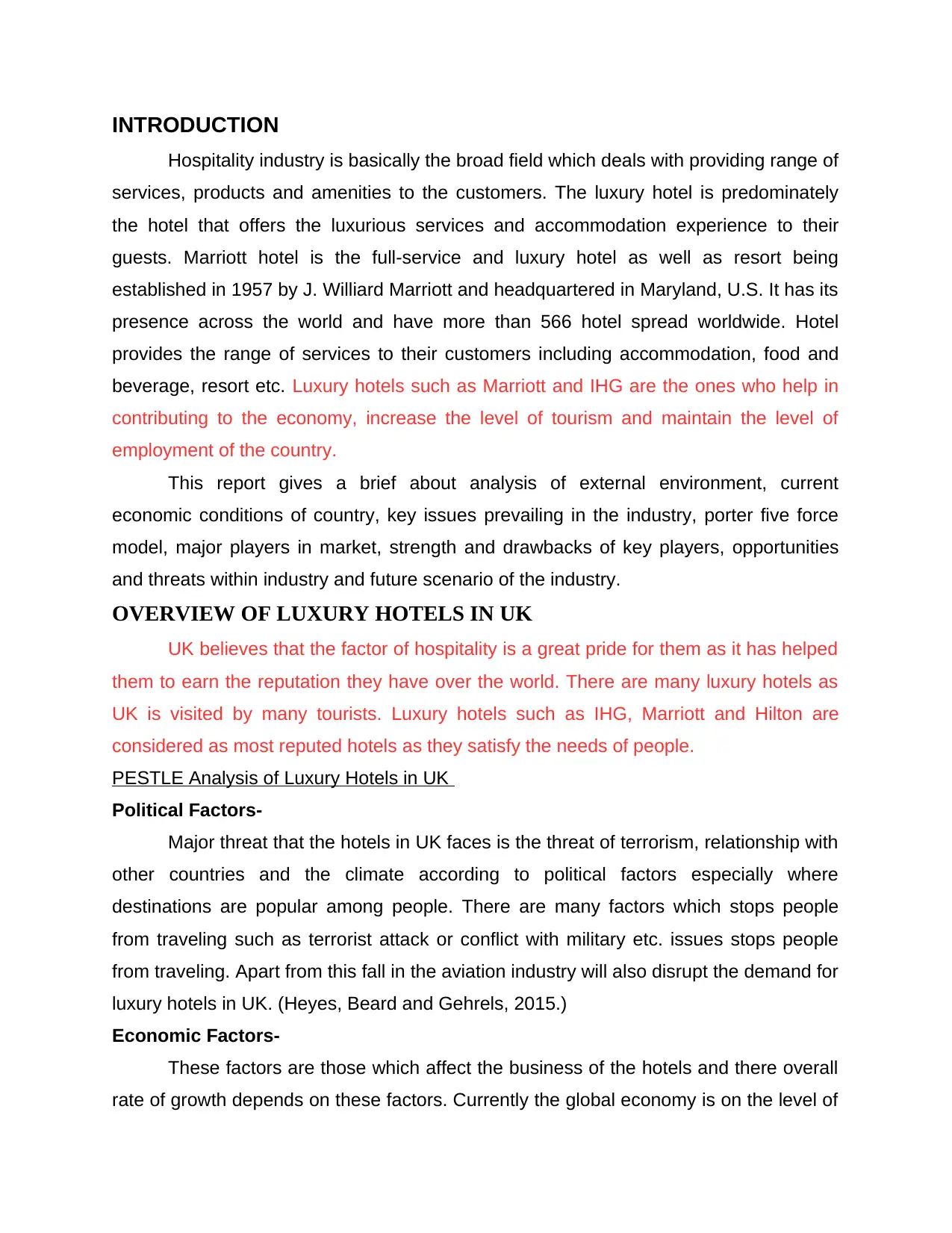
INTRODUCTION
Hospitality industry is basically the broad field which deals with providing range of
services, products and amenities to the customers. The luxury hotel is predominately
the hotel that offers the luxurious services and accommodation experience to their
guests. Marriott hotel is the full-service and luxury hotel as well as resort being
established in 1957 by J. Williard Marriott and headquartered in Maryland, U.S. It has its
presence across the world and have more than 566 hotel spread worldwide. Hotel
provides the range of services to their customers including accommodation, food and
beverage, resort etc. Luxury hotels such as Marriott and IHG are the ones who help in
contributing to the economy, increase the level of tourism and maintain the level of
employment of the country.
This report gives a brief about analysis of external environment, current
economic conditions of country, key issues prevailing in the industry, porter five force
model, major players in market, strength and drawbacks of key players, opportunities
and threats within industry and future scenario of the industry.
OVERVIEW OF LUXURY HOTELS IN UK
UK believes that the factor of hospitality is a great pride for them as it has helped
them to earn the reputation they have over the world. There are many luxury hotels as
UK is visited by many tourists. Luxury hotels such as IHG, Marriott and Hilton are
considered as most reputed hotels as they satisfy the needs of people.
PESTLE Analysis of Luxury Hotels in UK
Political Factors-
Major threat that the hotels in UK faces is the threat of terrorism, relationship with
other countries and the climate according to political factors especially where
destinations are popular among people. There are many factors which stops people
from traveling such as terrorist attack or conflict with military etc. issues stops people
from traveling. Apart from this fall in the aviation industry will also disrupt the demand for
luxury hotels in UK. (Heyes, Beard and Gehrels, 2015.)
Economic Factors-
These factors are those which affect the business of the hotels and there overall
rate of growth depends on these factors. Currently the global economy is on the level of
Hospitality industry is basically the broad field which deals with providing range of
services, products and amenities to the customers. The luxury hotel is predominately
the hotel that offers the luxurious services and accommodation experience to their
guests. Marriott hotel is the full-service and luxury hotel as well as resort being
established in 1957 by J. Williard Marriott and headquartered in Maryland, U.S. It has its
presence across the world and have more than 566 hotel spread worldwide. Hotel
provides the range of services to their customers including accommodation, food and
beverage, resort etc. Luxury hotels such as Marriott and IHG are the ones who help in
contributing to the economy, increase the level of tourism and maintain the level of
employment of the country.
This report gives a brief about analysis of external environment, current
economic conditions of country, key issues prevailing in the industry, porter five force
model, major players in market, strength and drawbacks of key players, opportunities
and threats within industry and future scenario of the industry.
OVERVIEW OF LUXURY HOTELS IN UK
UK believes that the factor of hospitality is a great pride for them as it has helped
them to earn the reputation they have over the world. There are many luxury hotels as
UK is visited by many tourists. Luxury hotels such as IHG, Marriott and Hilton are
considered as most reputed hotels as they satisfy the needs of people.
PESTLE Analysis of Luxury Hotels in UK
Political Factors-
Major threat that the hotels in UK faces is the threat of terrorism, relationship with
other countries and the climate according to political factors especially where
destinations are popular among people. There are many factors which stops people
from traveling such as terrorist attack or conflict with military etc. issues stops people
from traveling. Apart from this fall in the aviation industry will also disrupt the demand for
luxury hotels in UK. (Heyes, Beard and Gehrels, 2015.)
Economic Factors-
These factors are those which affect the business of the hotels and there overall
rate of growth depends on these factors. Currently the global economy is on the level of
⊘ This is a preview!⊘
Do you want full access?
Subscribe today to unlock all pages.

Trusted by 1+ million students worldwide
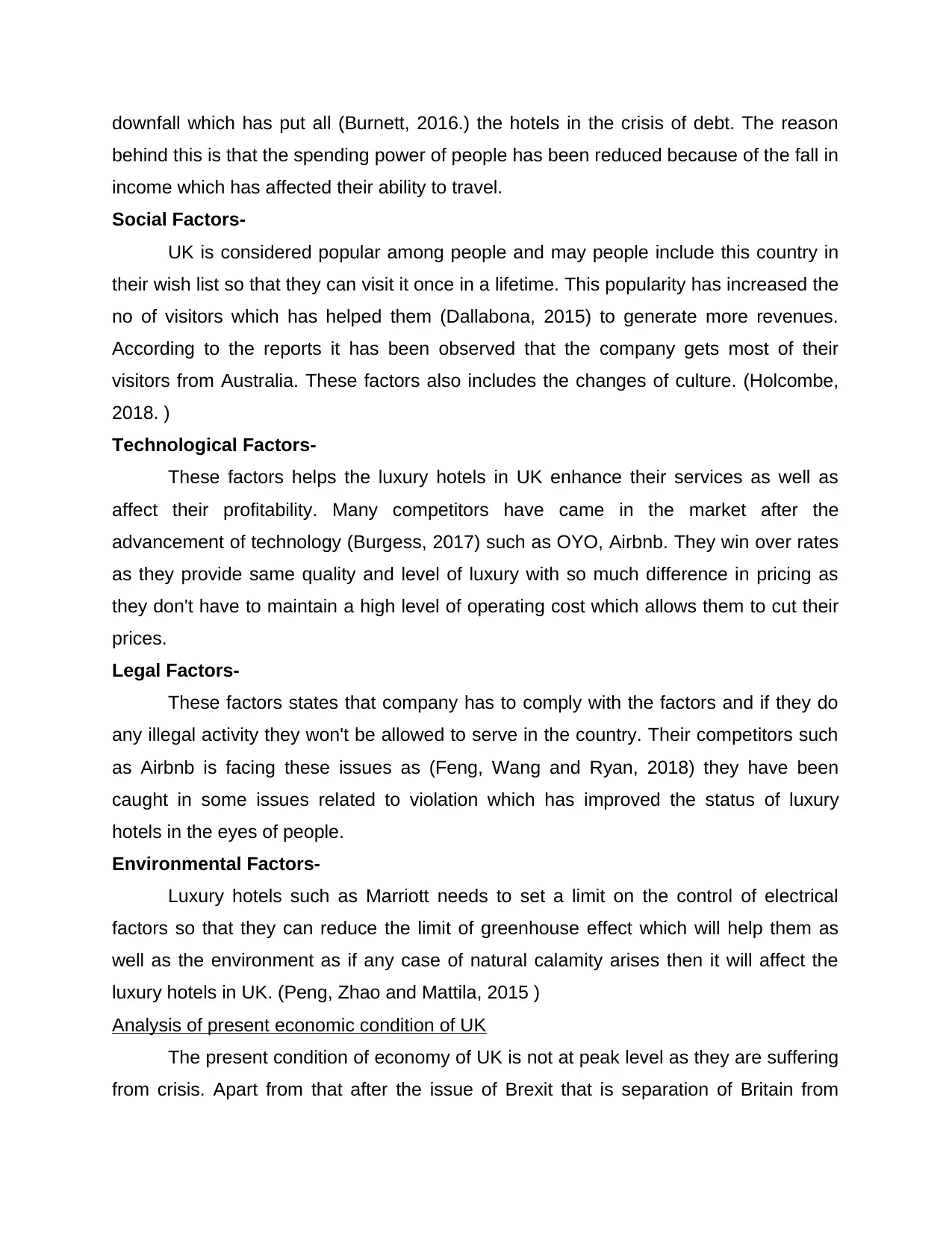
downfall which has put all (Burnett, 2016.) the hotels in the crisis of debt. The reason
behind this is that the spending power of people has been reduced because of the fall in
income which has affected their ability to travel.
Social Factors-
UK is considered popular among people and may people include this country in
their wish list so that they can visit it once in a lifetime. This popularity has increased the
no of visitors which has helped them (Dallabona, 2015) to generate more revenues.
According to the reports it has been observed that the company gets most of their
visitors from Australia. These factors also includes the changes of culture. (Holcombe,
2018. )
Technological Factors-
These factors helps the luxury hotels in UK enhance their services as well as
affect their profitability. Many competitors have came in the market after the
advancement of technology (Burgess, 2017) such as OYO, Airbnb. They win over rates
as they provide same quality and level of luxury with so much difference in pricing as
they don't have to maintain a high level of operating cost which allows them to cut their
prices.
Legal Factors-
These factors states that company has to comply with the factors and if they do
any illegal activity they won't be allowed to serve in the country. Their competitors such
as Airbnb is facing these issues as (Feng, Wang and Ryan, 2018) they have been
caught in some issues related to violation which has improved the status of luxury
hotels in the eyes of people.
Environmental Factors-
Luxury hotels such as Marriott needs to set a limit on the control of electrical
factors so that they can reduce the limit of greenhouse effect which will help them as
well as the environment as if any case of natural calamity arises then it will affect the
luxury hotels in UK. (Peng, Zhao and Mattila, 2015 )
Analysis of present economic condition of UK
The present condition of economy of UK is not at peak level as they are suffering
from crisis. Apart from that after the issue of Brexit that is separation of Britain from
behind this is that the spending power of people has been reduced because of the fall in
income which has affected their ability to travel.
Social Factors-
UK is considered popular among people and may people include this country in
their wish list so that they can visit it once in a lifetime. This popularity has increased the
no of visitors which has helped them (Dallabona, 2015) to generate more revenues.
According to the reports it has been observed that the company gets most of their
visitors from Australia. These factors also includes the changes of culture. (Holcombe,
2018. )
Technological Factors-
These factors helps the luxury hotels in UK enhance their services as well as
affect their profitability. Many competitors have came in the market after the
advancement of technology (Burgess, 2017) such as OYO, Airbnb. They win over rates
as they provide same quality and level of luxury with so much difference in pricing as
they don't have to maintain a high level of operating cost which allows them to cut their
prices.
Legal Factors-
These factors states that company has to comply with the factors and if they do
any illegal activity they won't be allowed to serve in the country. Their competitors such
as Airbnb is facing these issues as (Feng, Wang and Ryan, 2018) they have been
caught in some issues related to violation which has improved the status of luxury
hotels in the eyes of people.
Environmental Factors-
Luxury hotels such as Marriott needs to set a limit on the control of electrical
factors so that they can reduce the limit of greenhouse effect which will help them as
well as the environment as if any case of natural calamity arises then it will affect the
luxury hotels in UK. (Peng, Zhao and Mattila, 2015 )
Analysis of present economic condition of UK
The present condition of economy of UK is not at peak level as they are suffering
from crisis. Apart from that after the issue of Brexit that is separation of Britain from
Paraphrase This Document
Need a fresh take? Get an instant paraphrase of this document with our AI Paraphraser
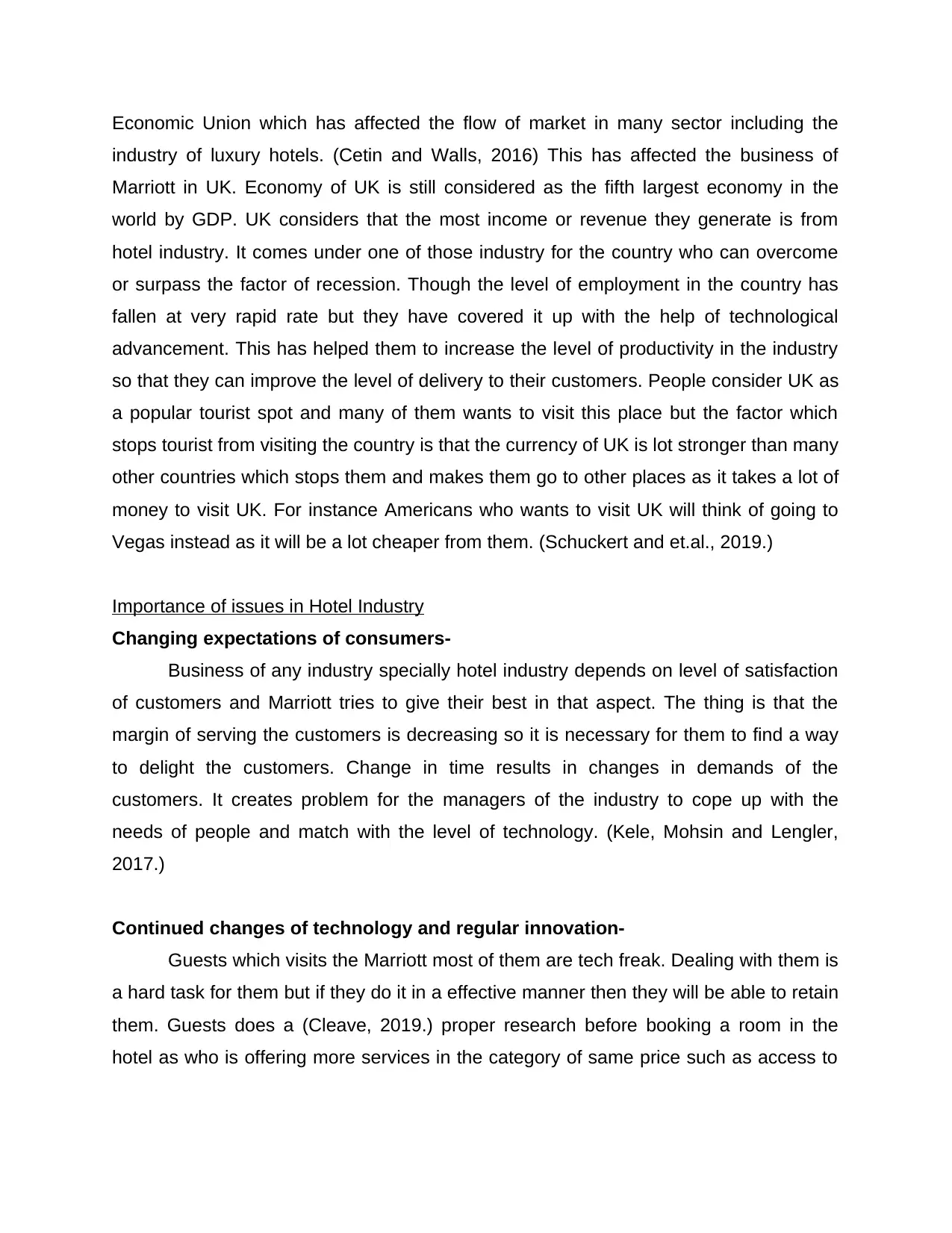
Economic Union which has affected the flow of market in many sector including the
industry of luxury hotels. (Cetin and Walls, 2016) This has affected the business of
Marriott in UK. Economy of UK is still considered as the fifth largest economy in the
world by GDP. UK considers that the most income or revenue they generate is from
hotel industry. It comes under one of those industry for the country who can overcome
or surpass the factor of recession. Though the level of employment in the country has
fallen at very rapid rate but they have covered it up with the help of technological
advancement. This has helped them to increase the level of productivity in the industry
so that they can improve the level of delivery to their customers. People consider UK as
a popular tourist spot and many of them wants to visit this place but the factor which
stops tourist from visiting the country is that the currency of UK is lot stronger than many
other countries which stops them and makes them go to other places as it takes a lot of
money to visit UK. For instance Americans who wants to visit UK will think of going to
Vegas instead as it will be a lot cheaper from them. (Schuckert and et.al., 2019.)
Importance of issues in Hotel Industry
Changing expectations of consumers-
Business of any industry specially hotel industry depends on level of satisfaction
of customers and Marriott tries to give their best in that aspect. The thing is that the
margin of serving the customers is decreasing so it is necessary for them to find a way
to delight the customers. Change in time results in changes in demands of the
customers. It creates problem for the managers of the industry to cope up with the
needs of people and match with the level of technology. (Kele, Mohsin and Lengler,
2017.)
Continued changes of technology and regular innovation-
Guests which visits the Marriott most of them are tech freak. Dealing with them is
a hard task for them but if they do it in a effective manner then they will be able to retain
them. Guests does a (Cleave, 2019.) proper research before booking a room in the
hotel as who is offering more services in the category of same price such as access to
industry of luxury hotels. (Cetin and Walls, 2016) This has affected the business of
Marriott in UK. Economy of UK is still considered as the fifth largest economy in the
world by GDP. UK considers that the most income or revenue they generate is from
hotel industry. It comes under one of those industry for the country who can overcome
or surpass the factor of recession. Though the level of employment in the country has
fallen at very rapid rate but they have covered it up with the help of technological
advancement. This has helped them to increase the level of productivity in the industry
so that they can improve the level of delivery to their customers. People consider UK as
a popular tourist spot and many of them wants to visit this place but the factor which
stops tourist from visiting the country is that the currency of UK is lot stronger than many
other countries which stops them and makes them go to other places as it takes a lot of
money to visit UK. For instance Americans who wants to visit UK will think of going to
Vegas instead as it will be a lot cheaper from them. (Schuckert and et.al., 2019.)
Importance of issues in Hotel Industry
Changing expectations of consumers-
Business of any industry specially hotel industry depends on level of satisfaction
of customers and Marriott tries to give their best in that aspect. The thing is that the
margin of serving the customers is decreasing so it is necessary for them to find a way
to delight the customers. Change in time results in changes in demands of the
customers. It creates problem for the managers of the industry to cope up with the
needs of people and match with the level of technology. (Kele, Mohsin and Lengler,
2017.)
Continued changes of technology and regular innovation-
Guests which visits the Marriott most of them are tech freak. Dealing with them is
a hard task for them but if they do it in a effective manner then they will be able to retain
them. Guests does a (Cleave, 2019.) proper research before booking a room in the
hotel as who is offering more services in the category of same price such as access to
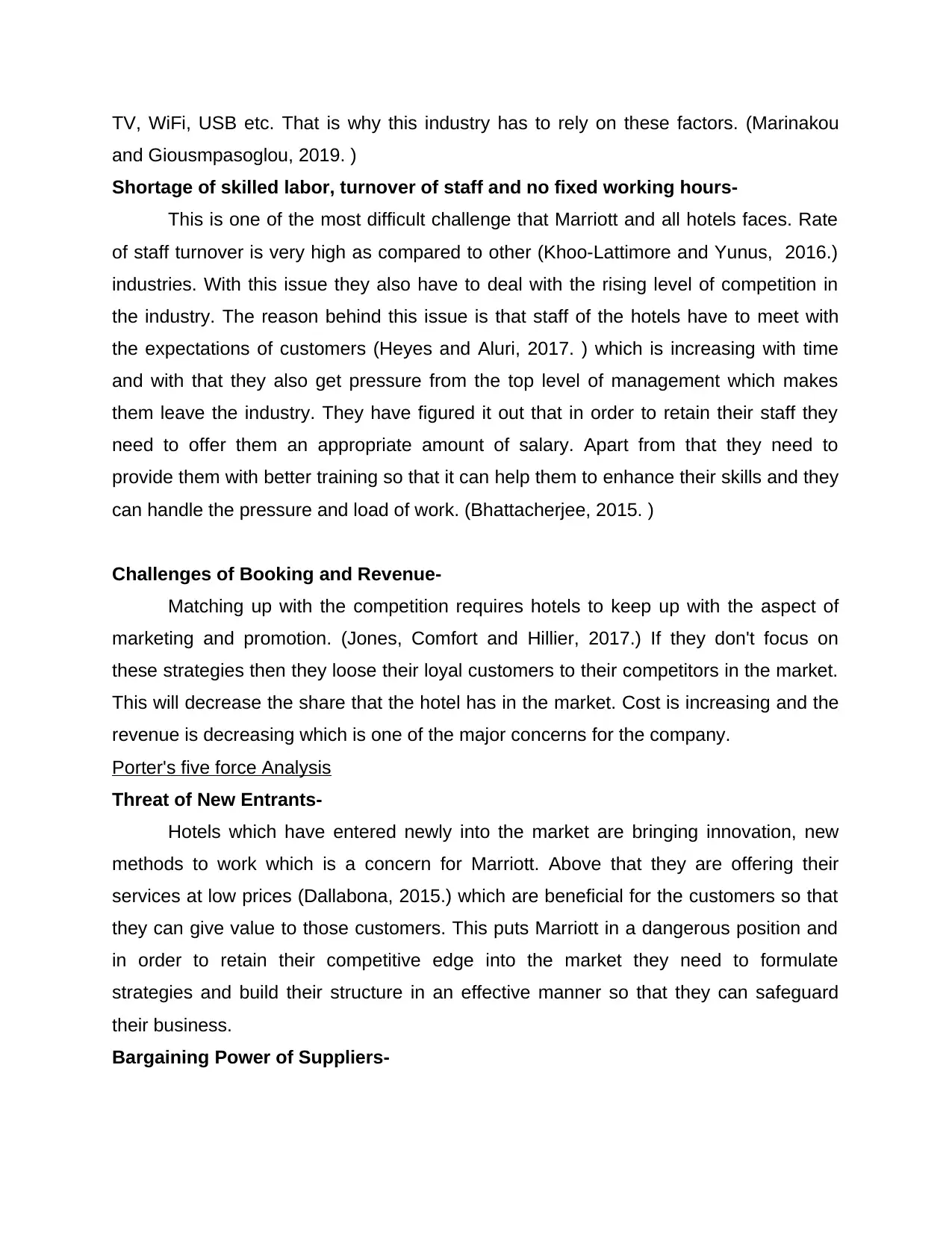
TV, WiFi, USB etc. That is why this industry has to rely on these factors. (Marinakou
and Giousmpasoglou, 2019. )
Shortage of skilled labor, turnover of staff and no fixed working hours-
This is one of the most difficult challenge that Marriott and all hotels faces. Rate
of staff turnover is very high as compared to other (Khoo-Lattimore and Yunus, 2016.)
industries. With this issue they also have to deal with the rising level of competition in
the industry. The reason behind this issue is that staff of the hotels have to meet with
the expectations of customers (Heyes and Aluri, 2017. ) which is increasing with time
and with that they also get pressure from the top level of management which makes
them leave the industry. They have figured it out that in order to retain their staff they
need to offer them an appropriate amount of salary. Apart from that they need to
provide them with better training so that it can help them to enhance their skills and they
can handle the pressure and load of work. (Bhattacherjee, 2015. )
Challenges of Booking and Revenue-
Matching up with the competition requires hotels to keep up with the aspect of
marketing and promotion. (Jones, Comfort and Hillier, 2017.) If they don't focus on
these strategies then they loose their loyal customers to their competitors in the market.
This will decrease the share that the hotel has in the market. Cost is increasing and the
revenue is decreasing which is one of the major concerns for the company.
Porter's five force Analysis
Threat of New Entrants-
Hotels which have entered newly into the market are bringing innovation, new
methods to work which is a concern for Marriott. Above that they are offering their
services at low prices (Dallabona, 2015.) which are beneficial for the customers so that
they can give value to those customers. This puts Marriott in a dangerous position and
in order to retain their competitive edge into the market they need to formulate
strategies and build their structure in an effective manner so that they can safeguard
their business.
Bargaining Power of Suppliers-
and Giousmpasoglou, 2019. )
Shortage of skilled labor, turnover of staff and no fixed working hours-
This is one of the most difficult challenge that Marriott and all hotels faces. Rate
of staff turnover is very high as compared to other (Khoo-Lattimore and Yunus, 2016.)
industries. With this issue they also have to deal with the rising level of competition in
the industry. The reason behind this issue is that staff of the hotels have to meet with
the expectations of customers (Heyes and Aluri, 2017. ) which is increasing with time
and with that they also get pressure from the top level of management which makes
them leave the industry. They have figured it out that in order to retain their staff they
need to offer them an appropriate amount of salary. Apart from that they need to
provide them with better training so that it can help them to enhance their skills and they
can handle the pressure and load of work. (Bhattacherjee, 2015. )
Challenges of Booking and Revenue-
Matching up with the competition requires hotels to keep up with the aspect of
marketing and promotion. (Jones, Comfort and Hillier, 2017.) If they don't focus on
these strategies then they loose their loyal customers to their competitors in the market.
This will decrease the share that the hotel has in the market. Cost is increasing and the
revenue is decreasing which is one of the major concerns for the company.
Porter's five force Analysis
Threat of New Entrants-
Hotels which have entered newly into the market are bringing innovation, new
methods to work which is a concern for Marriott. Above that they are offering their
services at low prices (Dallabona, 2015.) which are beneficial for the customers so that
they can give value to those customers. This puts Marriott in a dangerous position and
in order to retain their competitive edge into the market they need to formulate
strategies and build their structure in an effective manner so that they can safeguard
their business.
Bargaining Power of Suppliers-
⊘ This is a preview!⊘
Do you want full access?
Subscribe today to unlock all pages.

Trusted by 1+ million students worldwide
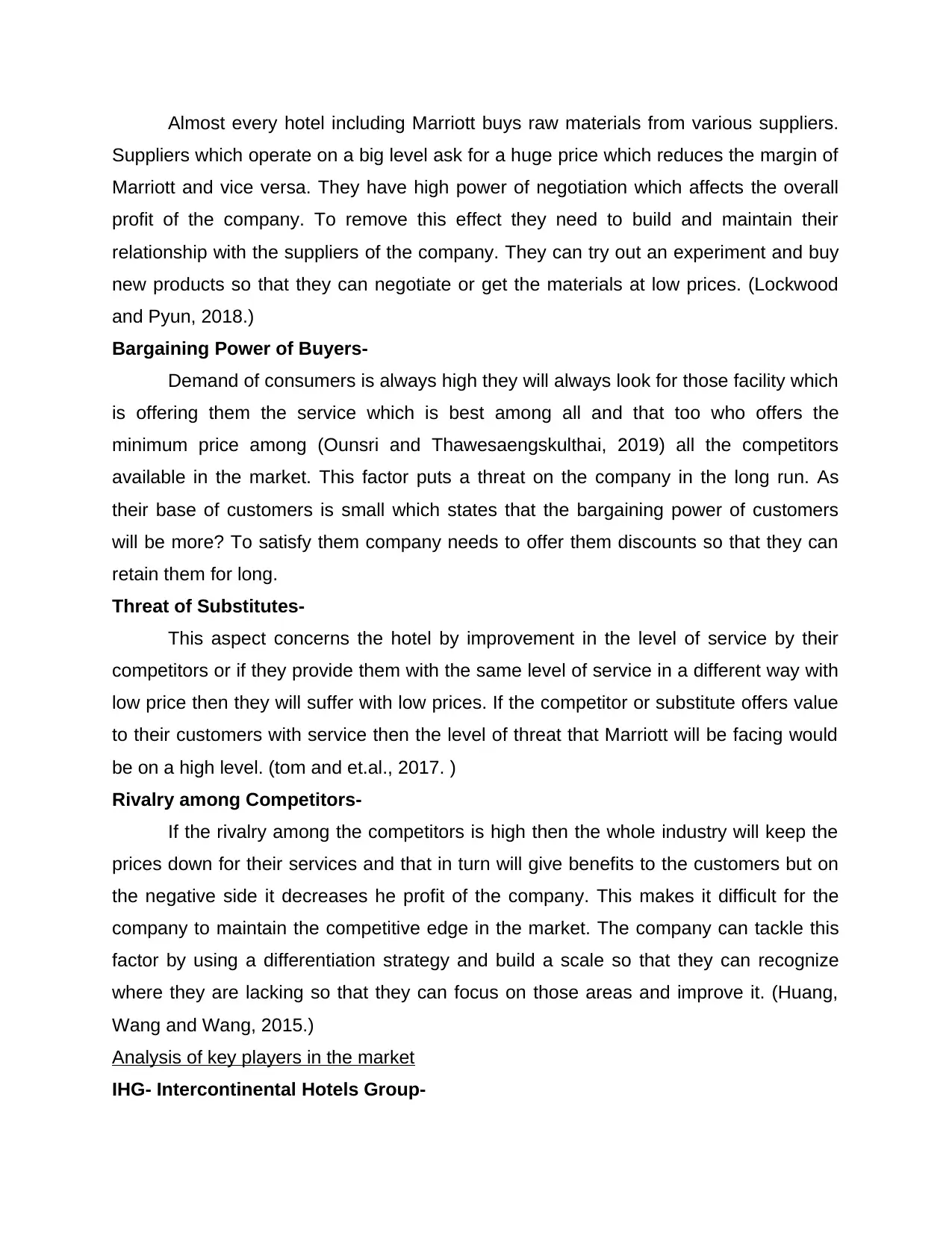
Almost every hotel including Marriott buys raw materials from various suppliers.
Suppliers which operate on a big level ask for a huge price which reduces the margin of
Marriott and vice versa. They have high power of negotiation which affects the overall
profit of the company. To remove this effect they need to build and maintain their
relationship with the suppliers of the company. They can try out an experiment and buy
new products so that they can negotiate or get the materials at low prices. (Lockwood
and Pyun, 2018.)
Bargaining Power of Buyers-
Demand of consumers is always high they will always look for those facility which
is offering them the service which is best among all and that too who offers the
minimum price among (Ounsri and Thawesaengskulthai, 2019) all the competitors
available in the market. This factor puts a threat on the company in the long run. As
their base of customers is small which states that the bargaining power of customers
will be more? To satisfy them company needs to offer them discounts so that they can
retain them for long.
Threat of Substitutes-
This aspect concerns the hotel by improvement in the level of service by their
competitors or if they provide them with the same level of service in a different way with
low price then they will suffer with low prices. If the competitor or substitute offers value
to their customers with service then the level of threat that Marriott will be facing would
be on a high level. (tom and et.al., 2017. )
Rivalry among Competitors-
If the rivalry among the competitors is high then the whole industry will keep the
prices down for their services and that in turn will give benefits to the customers but on
the negative side it decreases he profit of the company. This makes it difficult for the
company to maintain the competitive edge in the market. The company can tackle this
factor by using a differentiation strategy and build a scale so that they can recognize
where they are lacking so that they can focus on those areas and improve it. (Huang,
Wang and Wang, 2015.)
Analysis of key players in the market
IHG- Intercontinental Hotels Group-
Suppliers which operate on a big level ask for a huge price which reduces the margin of
Marriott and vice versa. They have high power of negotiation which affects the overall
profit of the company. To remove this effect they need to build and maintain their
relationship with the suppliers of the company. They can try out an experiment and buy
new products so that they can negotiate or get the materials at low prices. (Lockwood
and Pyun, 2018.)
Bargaining Power of Buyers-
Demand of consumers is always high they will always look for those facility which
is offering them the service which is best among all and that too who offers the
minimum price among (Ounsri and Thawesaengskulthai, 2019) all the competitors
available in the market. This factor puts a threat on the company in the long run. As
their base of customers is small which states that the bargaining power of customers
will be more? To satisfy them company needs to offer them discounts so that they can
retain them for long.
Threat of Substitutes-
This aspect concerns the hotel by improvement in the level of service by their
competitors or if they provide them with the same level of service in a different way with
low price then they will suffer with low prices. If the competitor or substitute offers value
to their customers with service then the level of threat that Marriott will be facing would
be on a high level. (tom and et.al., 2017. )
Rivalry among Competitors-
If the rivalry among the competitors is high then the whole industry will keep the
prices down for their services and that in turn will give benefits to the customers but on
the negative side it decreases he profit of the company. This makes it difficult for the
company to maintain the competitive edge in the market. The company can tackle this
factor by using a differentiation strategy and build a scale so that they can recognize
where they are lacking so that they can focus on those areas and improve it. (Huang,
Wang and Wang, 2015.)
Analysis of key players in the market
IHG- Intercontinental Hotels Group-
Paraphrase This Document
Need a fresh take? Get an instant paraphrase of this document with our AI Paraphraser
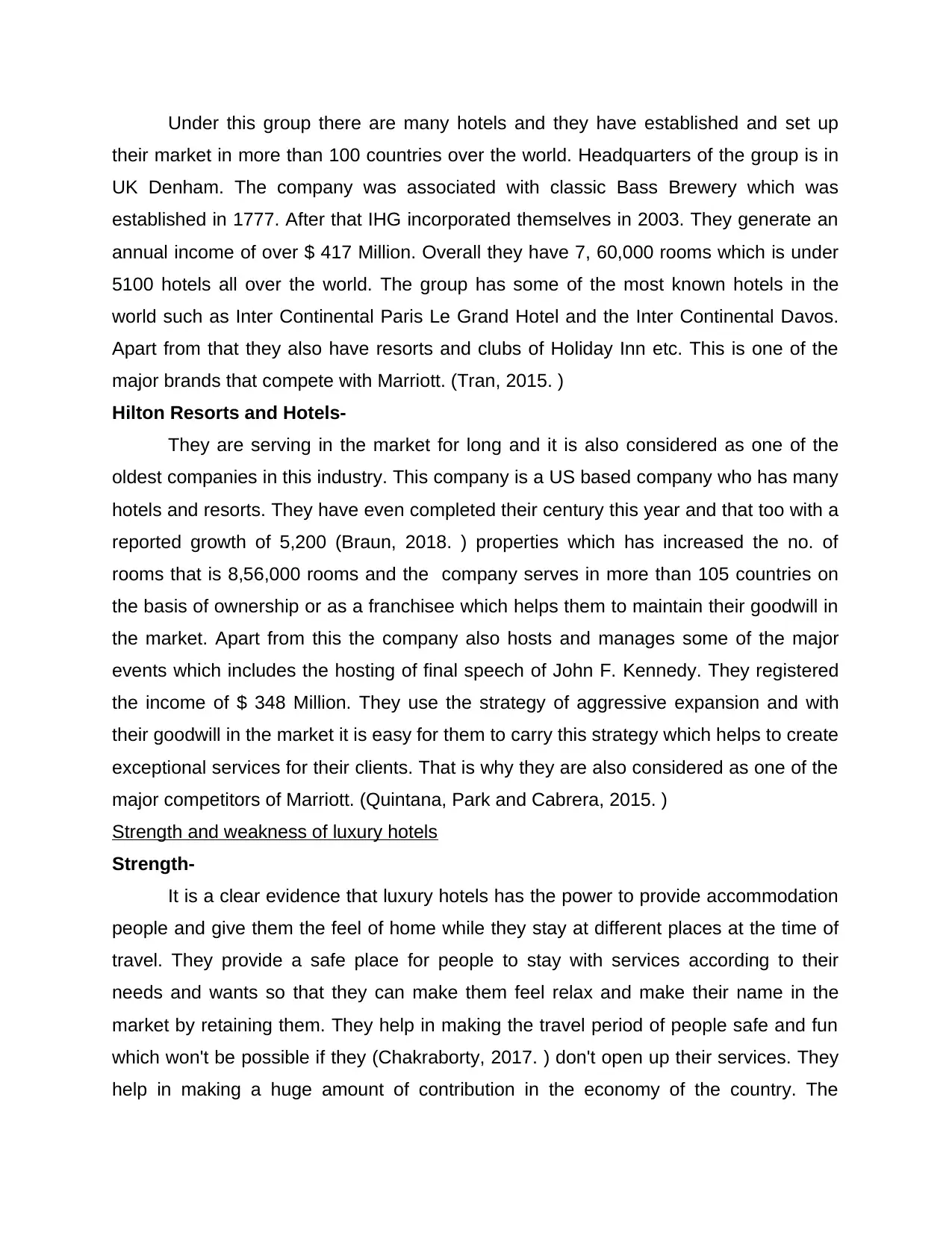
Under this group there are many hotels and they have established and set up
their market in more than 100 countries over the world. Headquarters of the group is in
UK Denham. The company was associated with classic Bass Brewery which was
established in 1777. After that IHG incorporated themselves in 2003. They generate an
annual income of over $ 417 Million. Overall they have 7, 60,000 rooms which is under
5100 hotels all over the world. The group has some of the most known hotels in the
world such as Inter Continental Paris Le Grand Hotel and the Inter Continental Davos.
Apart from that they also have resorts and clubs of Holiday Inn etc. This is one of the
major brands that compete with Marriott. (Tran, 2015. )
Hilton Resorts and Hotels-
They are serving in the market for long and it is also considered as one of the
oldest companies in this industry. This company is a US based company who has many
hotels and resorts. They have even completed their century this year and that too with a
reported growth of 5,200 (Braun, 2018. ) properties which has increased the no. of
rooms that is 8,56,000 rooms and the company serves in more than 105 countries on
the basis of ownership or as a franchisee which helps them to maintain their goodwill in
the market. Apart from this the company also hosts and manages some of the major
events which includes the hosting of final speech of John F. Kennedy. They registered
the income of $ 348 Million. They use the strategy of aggressive expansion and with
their goodwill in the market it is easy for them to carry this strategy which helps to create
exceptional services for their clients. That is why they are also considered as one of the
major competitors of Marriott. (Quintana, Park and Cabrera, 2015. )
Strength and weakness of luxury hotels
Strength-
It is a clear evidence that luxury hotels has the power to provide accommodation
people and give them the feel of home while they stay at different places at the time of
travel. They provide a safe place for people to stay with services according to their
needs and wants so that they can make them feel relax and make their name in the
market by retaining them. They help in making the travel period of people safe and fun
which won't be possible if they (Chakraborty, 2017. ) don't open up their services. They
help in making a huge amount of contribution in the economy of the country. The
their market in more than 100 countries over the world. Headquarters of the group is in
UK Denham. The company was associated with classic Bass Brewery which was
established in 1777. After that IHG incorporated themselves in 2003. They generate an
annual income of over $ 417 Million. Overall they have 7, 60,000 rooms which is under
5100 hotels all over the world. The group has some of the most known hotels in the
world such as Inter Continental Paris Le Grand Hotel and the Inter Continental Davos.
Apart from that they also have resorts and clubs of Holiday Inn etc. This is one of the
major brands that compete with Marriott. (Tran, 2015. )
Hilton Resorts and Hotels-
They are serving in the market for long and it is also considered as one of the
oldest companies in this industry. This company is a US based company who has many
hotels and resorts. They have even completed their century this year and that too with a
reported growth of 5,200 (Braun, 2018. ) properties which has increased the no. of
rooms that is 8,56,000 rooms and the company serves in more than 105 countries on
the basis of ownership or as a franchisee which helps them to maintain their goodwill in
the market. Apart from this the company also hosts and manages some of the major
events which includes the hosting of final speech of John F. Kennedy. They registered
the income of $ 348 Million. They use the strategy of aggressive expansion and with
their goodwill in the market it is easy for them to carry this strategy which helps to create
exceptional services for their clients. That is why they are also considered as one of the
major competitors of Marriott. (Quintana, Park and Cabrera, 2015. )
Strength and weakness of luxury hotels
Strength-
It is a clear evidence that luxury hotels has the power to provide accommodation
people and give them the feel of home while they stay at different places at the time of
travel. They provide a safe place for people to stay with services according to their
needs and wants so that they can make them feel relax and make their name in the
market by retaining them. They help in making the travel period of people safe and fun
which won't be possible if they (Chakraborty, 2017. ) don't open up their services. They
help in making a huge amount of contribution in the economy of the country. The
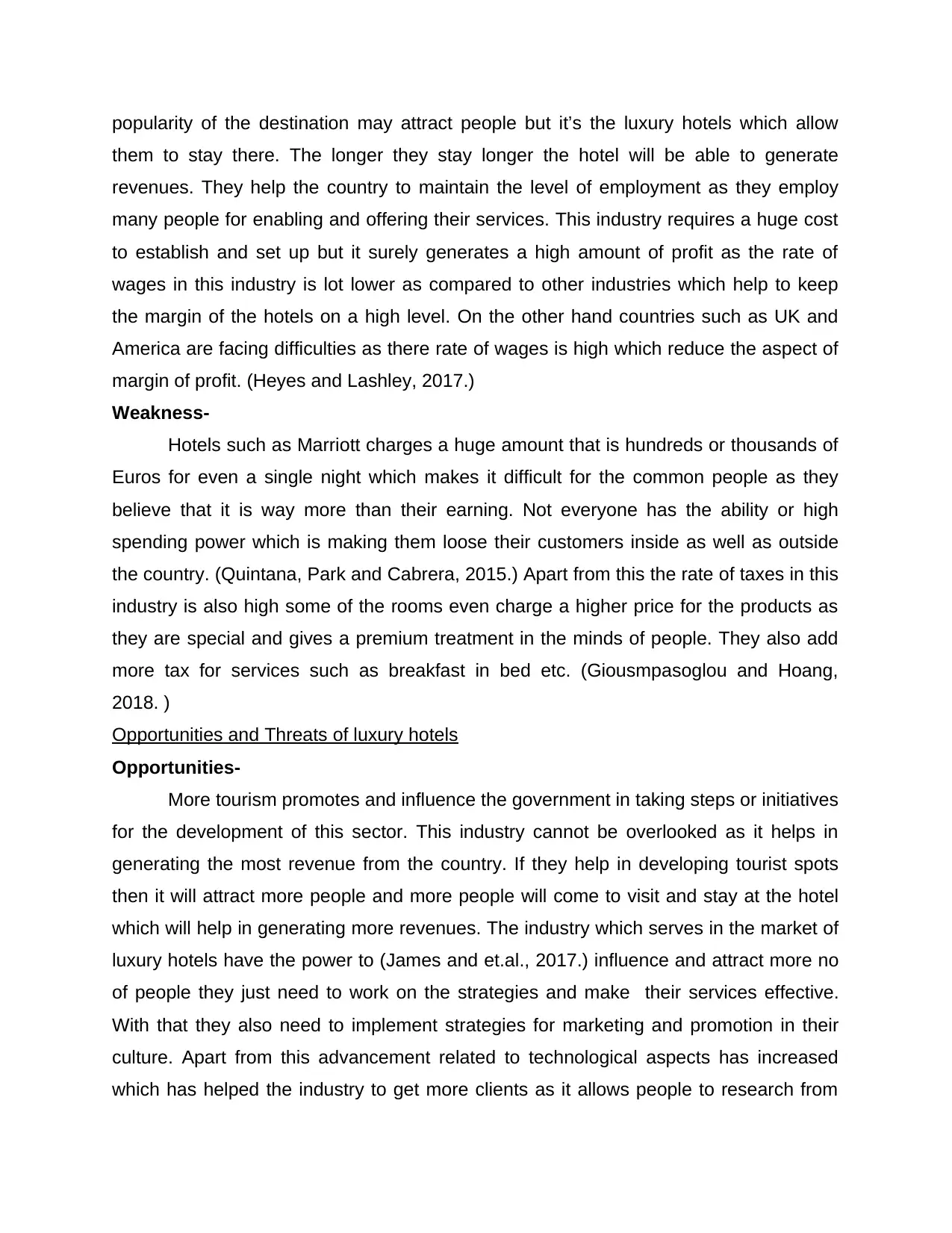
popularity of the destination may attract people but it’s the luxury hotels which allow
them to stay there. The longer they stay longer the hotel will be able to generate
revenues. They help the country to maintain the level of employment as they employ
many people for enabling and offering their services. This industry requires a huge cost
to establish and set up but it surely generates a high amount of profit as the rate of
wages in this industry is lot lower as compared to other industries which help to keep
the margin of the hotels on a high level. On the other hand countries such as UK and
America are facing difficulties as there rate of wages is high which reduce the aspect of
margin of profit. (Heyes and Lashley, 2017.)
Weakness-
Hotels such as Marriott charges a huge amount that is hundreds or thousands of
Euros for even a single night which makes it difficult for the common people as they
believe that it is way more than their earning. Not everyone has the ability or high
spending power which is making them loose their customers inside as well as outside
the country. (Quintana, Park and Cabrera, 2015.) Apart from this the rate of taxes in this
industry is also high some of the rooms even charge a higher price for the products as
they are special and gives a premium treatment in the minds of people. They also add
more tax for services such as breakfast in bed etc. (Giousmpasoglou and Hoang,
2018. )
Opportunities and Threats of luxury hotels
Opportunities-
More tourism promotes and influence the government in taking steps or initiatives
for the development of this sector. This industry cannot be overlooked as it helps in
generating the most revenue from the country. If they help in developing tourist spots
then it will attract more people and more people will come to visit and stay at the hotel
which will help in generating more revenues. The industry which serves in the market of
luxury hotels have the power to (James and et.al., 2017.) influence and attract more no
of people they just need to work on the strategies and make their services effective.
With that they also need to implement strategies for marketing and promotion in their
culture. Apart from this advancement related to technological aspects has increased
which has helped the industry to get more clients as it allows people to research from
them to stay there. The longer they stay longer the hotel will be able to generate
revenues. They help the country to maintain the level of employment as they employ
many people for enabling and offering their services. This industry requires a huge cost
to establish and set up but it surely generates a high amount of profit as the rate of
wages in this industry is lot lower as compared to other industries which help to keep
the margin of the hotels on a high level. On the other hand countries such as UK and
America are facing difficulties as there rate of wages is high which reduce the aspect of
margin of profit. (Heyes and Lashley, 2017.)
Weakness-
Hotels such as Marriott charges a huge amount that is hundreds or thousands of
Euros for even a single night which makes it difficult for the common people as they
believe that it is way more than their earning. Not everyone has the ability or high
spending power which is making them loose their customers inside as well as outside
the country. (Quintana, Park and Cabrera, 2015.) Apart from this the rate of taxes in this
industry is also high some of the rooms even charge a higher price for the products as
they are special and gives a premium treatment in the minds of people. They also add
more tax for services such as breakfast in bed etc. (Giousmpasoglou and Hoang,
2018. )
Opportunities and Threats of luxury hotels
Opportunities-
More tourism promotes and influence the government in taking steps or initiatives
for the development of this sector. This industry cannot be overlooked as it helps in
generating the most revenue from the country. If they help in developing tourist spots
then it will attract more people and more people will come to visit and stay at the hotel
which will help in generating more revenues. The industry which serves in the market of
luxury hotels have the power to (James and et.al., 2017.) influence and attract more no
of people they just need to work on the strategies and make their services effective.
With that they also need to implement strategies for marketing and promotion in their
culture. Apart from this advancement related to technological aspects has increased
which has helped the industry to get more clients as it allows people to research from
⊘ This is a preview!⊘
Do you want full access?
Subscribe today to unlock all pages.

Trusted by 1+ million students worldwide
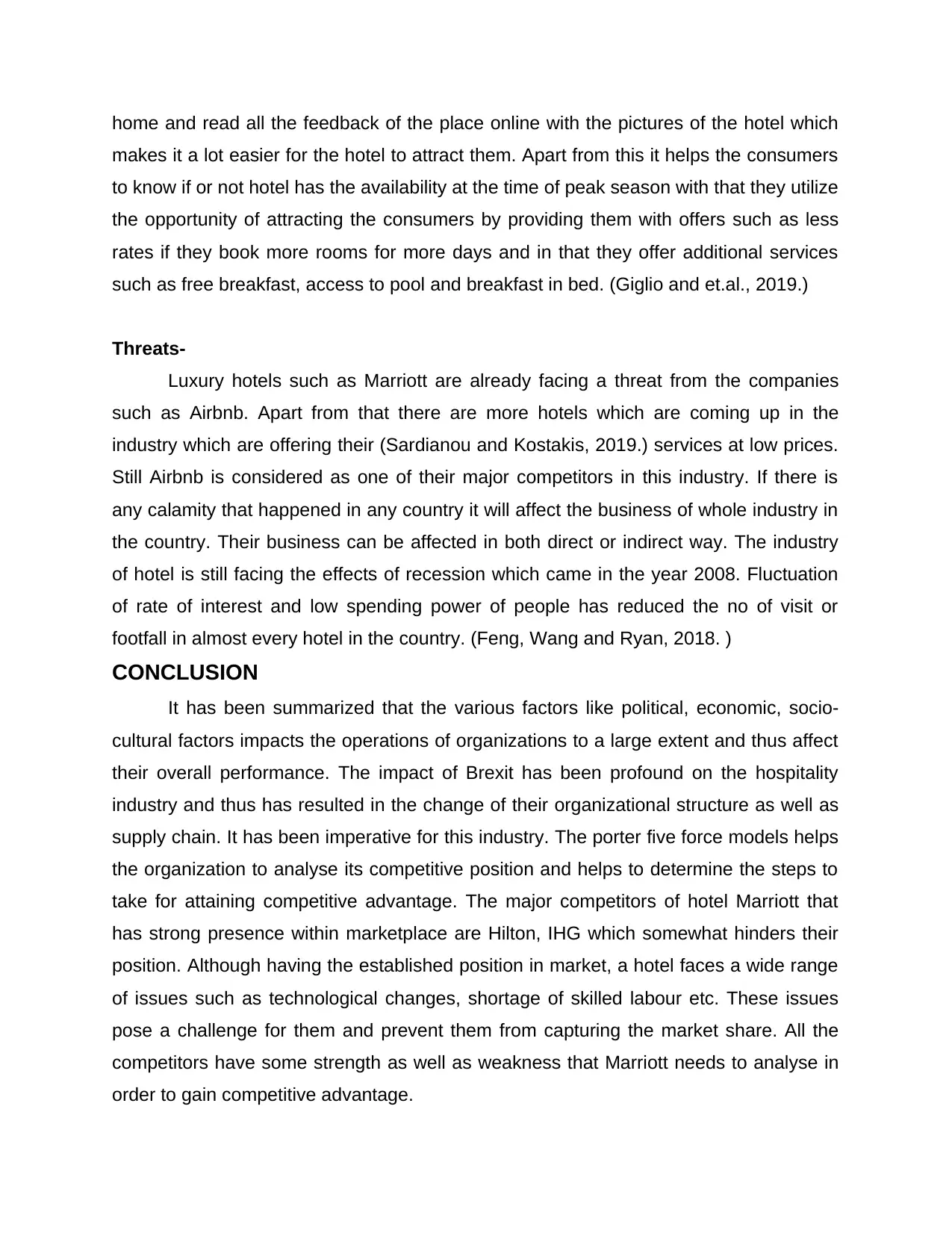
home and read all the feedback of the place online with the pictures of the hotel which
makes it a lot easier for the hotel to attract them. Apart from this it helps the consumers
to know if or not hotel has the availability at the time of peak season with that they utilize
the opportunity of attracting the consumers by providing them with offers such as less
rates if they book more rooms for more days and in that they offer additional services
such as free breakfast, access to pool and breakfast in bed. (Giglio and et.al., 2019.)
Threats-
Luxury hotels such as Marriott are already facing a threat from the companies
such as Airbnb. Apart from that there are more hotels which are coming up in the
industry which are offering their (Sardianou and Kostakis, 2019.) services at low prices.
Still Airbnb is considered as one of their major competitors in this industry. If there is
any calamity that happened in any country it will affect the business of whole industry in
the country. Their business can be affected in both direct or indirect way. The industry
of hotel is still facing the effects of recession which came in the year 2008. Fluctuation
of rate of interest and low spending power of people has reduced the no of visit or
footfall in almost every hotel in the country. (Feng, Wang and Ryan, 2018. )
CONCLUSION
It has been summarized that the various factors like political, economic, socio-
cultural factors impacts the operations of organizations to a large extent and thus affect
their overall performance. The impact of Brexit has been profound on the hospitality
industry and thus has resulted in the change of their organizational structure as well as
supply chain. It has been imperative for this industry. The porter five force models helps
the organization to analyse its competitive position and helps to determine the steps to
take for attaining competitive advantage. The major competitors of hotel Marriott that
has strong presence within marketplace are Hilton, IHG which somewhat hinders their
position. Although having the established position in market, a hotel faces a wide range
of issues such as technological changes, shortage of skilled labour etc. These issues
pose a challenge for them and prevent them from capturing the market share. All the
competitors have some strength as well as weakness that Marriott needs to analyse in
order to gain competitive advantage.
makes it a lot easier for the hotel to attract them. Apart from this it helps the consumers
to know if or not hotel has the availability at the time of peak season with that they utilize
the opportunity of attracting the consumers by providing them with offers such as less
rates if they book more rooms for more days and in that they offer additional services
such as free breakfast, access to pool and breakfast in bed. (Giglio and et.al., 2019.)
Threats-
Luxury hotels such as Marriott are already facing a threat from the companies
such as Airbnb. Apart from that there are more hotels which are coming up in the
industry which are offering their (Sardianou and Kostakis, 2019.) services at low prices.
Still Airbnb is considered as one of their major competitors in this industry. If there is
any calamity that happened in any country it will affect the business of whole industry in
the country. Their business can be affected in both direct or indirect way. The industry
of hotel is still facing the effects of recession which came in the year 2008. Fluctuation
of rate of interest and low spending power of people has reduced the no of visit or
footfall in almost every hotel in the country. (Feng, Wang and Ryan, 2018. )
CONCLUSION
It has been summarized that the various factors like political, economic, socio-
cultural factors impacts the operations of organizations to a large extent and thus affect
their overall performance. The impact of Brexit has been profound on the hospitality
industry and thus has resulted in the change of their organizational structure as well as
supply chain. It has been imperative for this industry. The porter five force models helps
the organization to analyse its competitive position and helps to determine the steps to
take for attaining competitive advantage. The major competitors of hotel Marriott that
has strong presence within marketplace are Hilton, IHG which somewhat hinders their
position. Although having the established position in market, a hotel faces a wide range
of issues such as technological changes, shortage of skilled labour etc. These issues
pose a challenge for them and prevent them from capturing the market share. All the
competitors have some strength as well as weakness that Marriott needs to analyse in
order to gain competitive advantage.
Paraphrase This Document
Need a fresh take? Get an instant paraphrase of this document with our AI Paraphraser
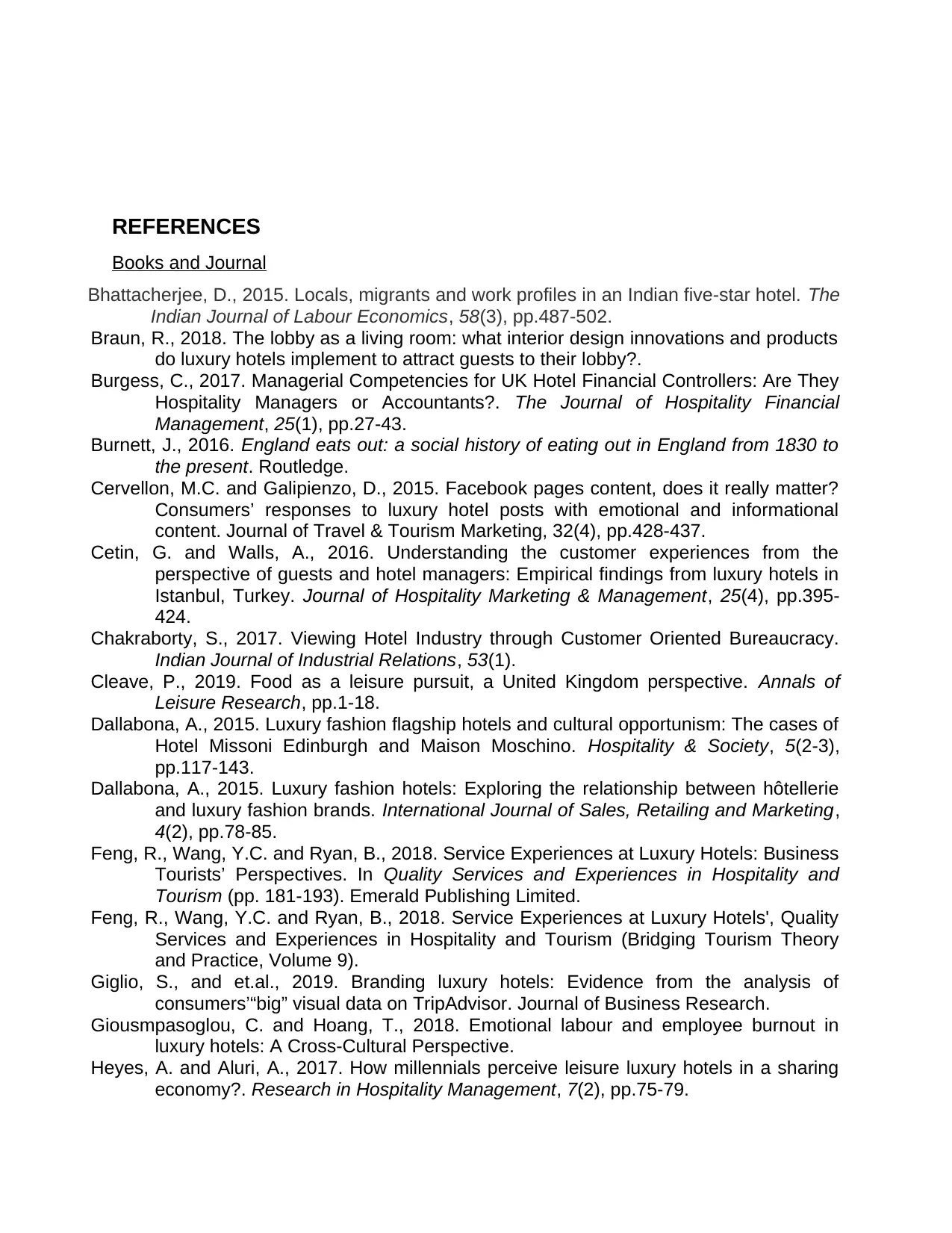
REFERENCES
Books and Journal
Bhattacherjee, D., 2015. Locals, migrants and work profiles in an Indian five-star hotel. The
Indian Journal of Labour Economics, 58(3), pp.487-502.
Braun, R., 2018. The lobby as a living room: what interior design innovations and products
do luxury hotels implement to attract guests to their lobby?.
Burgess, C., 2017. Managerial Competencies for UK Hotel Financial Controllers: Are They
Hospitality Managers or Accountants?. The Journal of Hospitality Financial
Management, 25(1), pp.27-43.
Burnett, J., 2016. England eats out: a social history of eating out in England from 1830 to
the present. Routledge.
Cervellon, M.C. and Galipienzo, D., 2015. Facebook pages content, does it really matter?
Consumers’ responses to luxury hotel posts with emotional and informational
content. Journal of Travel & Tourism Marketing, 32(4), pp.428-437.
Cetin, G. and Walls, A., 2016. Understanding the customer experiences from the
perspective of guests and hotel managers: Empirical findings from luxury hotels in
Istanbul, Turkey. Journal of Hospitality Marketing & Management, 25(4), pp.395-
424.
Chakraborty, S., 2017. Viewing Hotel Industry through Customer Oriented Bureaucracy.
Indian Journal of Industrial Relations, 53(1).
Cleave, P., 2019. Food as a leisure pursuit, a United Kingdom perspective. Annals of
Leisure Research, pp.1-18.
Dallabona, A., 2015. Luxury fashion flagship hotels and cultural opportunism: The cases of
Hotel Missoni Edinburgh and Maison Moschino. Hospitality & Society, 5(2-3),
pp.117-143.
Dallabona, A., 2015. Luxury fashion hotels: Exploring the relationship between hôtellerie
and luxury fashion brands. International Journal of Sales, Retailing and Marketing,
4(2), pp.78-85.
Feng, R., Wang, Y.C. and Ryan, B., 2018. Service Experiences at Luxury Hotels: Business
Tourists’ Perspectives. In Quality Services and Experiences in Hospitality and
Tourism (pp. 181-193). Emerald Publishing Limited.
Feng, R., Wang, Y.C. and Ryan, B., 2018. Service Experiences at Luxury Hotels', Quality
Services and Experiences in Hospitality and Tourism (Bridging Tourism Theory
and Practice, Volume 9).
Giglio, S., and et.al., 2019. Branding luxury hotels: Evidence from the analysis of
consumers’“big” visual data on TripAdvisor. Journal of Business Research.
Giousmpasoglou, C. and Hoang, T., 2018. Emotional labour and employee burnout in
luxury hotels: A Cross-Cultural Perspective.
Heyes, A. and Aluri, A., 2017. How millennials perceive leisure luxury hotels in a sharing
economy?. Research in Hospitality Management, 7(2), pp.75-79.
Books and Journal
Bhattacherjee, D., 2015. Locals, migrants and work profiles in an Indian five-star hotel. The
Indian Journal of Labour Economics, 58(3), pp.487-502.
Braun, R., 2018. The lobby as a living room: what interior design innovations and products
do luxury hotels implement to attract guests to their lobby?.
Burgess, C., 2017. Managerial Competencies for UK Hotel Financial Controllers: Are They
Hospitality Managers or Accountants?. The Journal of Hospitality Financial
Management, 25(1), pp.27-43.
Burnett, J., 2016. England eats out: a social history of eating out in England from 1830 to
the present. Routledge.
Cervellon, M.C. and Galipienzo, D., 2015. Facebook pages content, does it really matter?
Consumers’ responses to luxury hotel posts with emotional and informational
content. Journal of Travel & Tourism Marketing, 32(4), pp.428-437.
Cetin, G. and Walls, A., 2016. Understanding the customer experiences from the
perspective of guests and hotel managers: Empirical findings from luxury hotels in
Istanbul, Turkey. Journal of Hospitality Marketing & Management, 25(4), pp.395-
424.
Chakraborty, S., 2017. Viewing Hotel Industry through Customer Oriented Bureaucracy.
Indian Journal of Industrial Relations, 53(1).
Cleave, P., 2019. Food as a leisure pursuit, a United Kingdom perspective. Annals of
Leisure Research, pp.1-18.
Dallabona, A., 2015. Luxury fashion flagship hotels and cultural opportunism: The cases of
Hotel Missoni Edinburgh and Maison Moschino. Hospitality & Society, 5(2-3),
pp.117-143.
Dallabona, A., 2015. Luxury fashion hotels: Exploring the relationship between hôtellerie
and luxury fashion brands. International Journal of Sales, Retailing and Marketing,
4(2), pp.78-85.
Feng, R., Wang, Y.C. and Ryan, B., 2018. Service Experiences at Luxury Hotels: Business
Tourists’ Perspectives. In Quality Services and Experiences in Hospitality and
Tourism (pp. 181-193). Emerald Publishing Limited.
Feng, R., Wang, Y.C. and Ryan, B., 2018. Service Experiences at Luxury Hotels', Quality
Services and Experiences in Hospitality and Tourism (Bridging Tourism Theory
and Practice, Volume 9).
Giglio, S., and et.al., 2019. Branding luxury hotels: Evidence from the analysis of
consumers’“big” visual data on TripAdvisor. Journal of Business Research.
Giousmpasoglou, C. and Hoang, T., 2018. Emotional labour and employee burnout in
luxury hotels: A Cross-Cultural Perspective.
Heyes, A. and Aluri, A., 2017. How millennials perceive leisure luxury hotels in a sharing
economy?. Research in Hospitality Management, 7(2), pp.75-79.
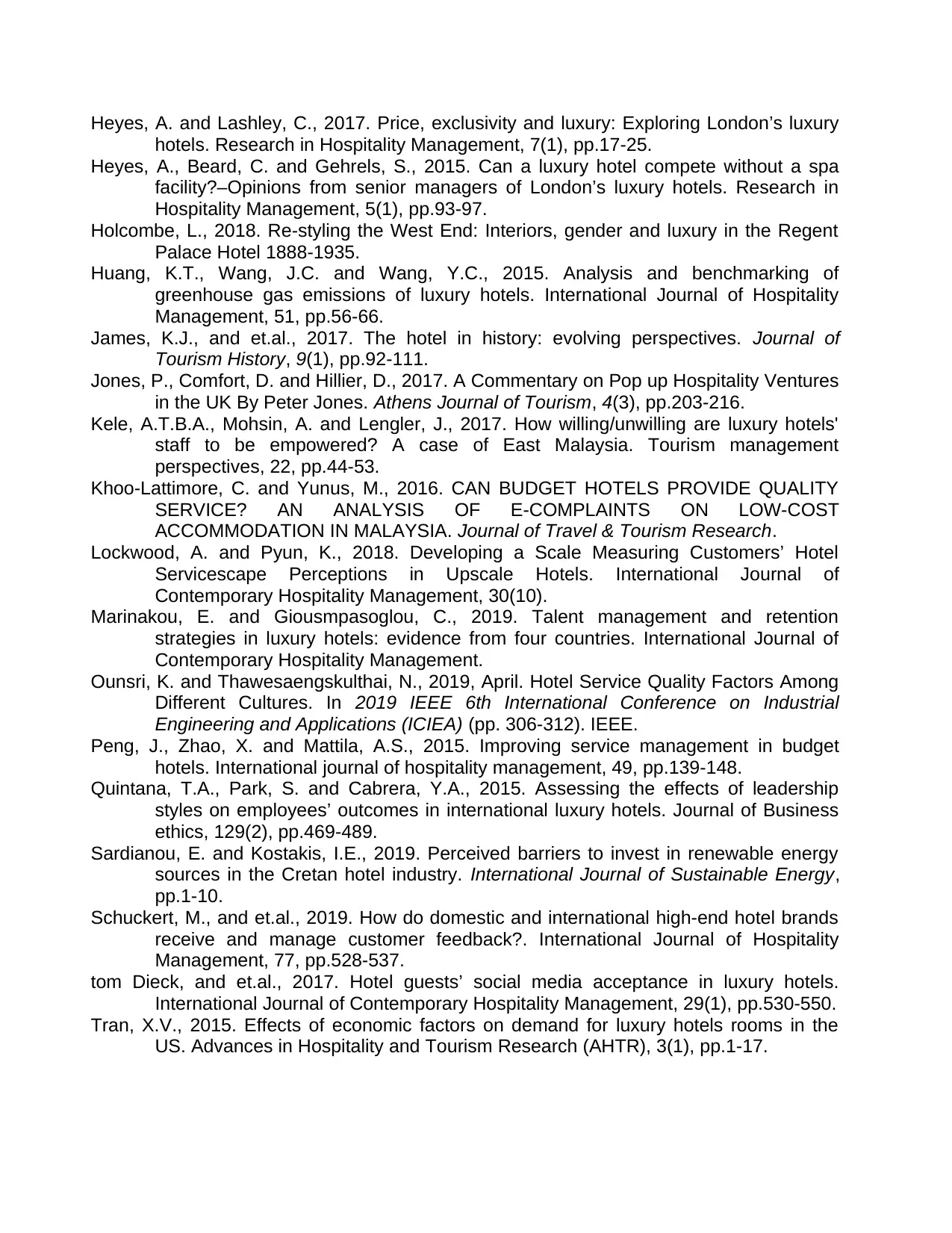
Heyes, A. and Lashley, C., 2017. Price, exclusivity and luxury: Exploring London’s luxury
hotels. Research in Hospitality Management, 7(1), pp.17-25.
Heyes, A., Beard, C. and Gehrels, S., 2015. Can a luxury hotel compete without a spa
facility?–Opinions from senior managers of London’s luxury hotels. Research in
Hospitality Management, 5(1), pp.93-97.
Holcombe, L., 2018. Re-styling the West End: Interiors, gender and luxury in the Regent
Palace Hotel 1888-1935.
Huang, K.T., Wang, J.C. and Wang, Y.C., 2015. Analysis and benchmarking of
greenhouse gas emissions of luxury hotels. International Journal of Hospitality
Management, 51, pp.56-66.
James, K.J., and et.al., 2017. The hotel in history: evolving perspectives. Journal of
Tourism History, 9(1), pp.92-111.
Jones, P., Comfort, D. and Hillier, D., 2017. A Commentary on Pop up Hospitality Ventures
in the UK By Peter Jones. Athens Journal of Tourism, 4(3), pp.203-216.
Kele, A.T.B.A., Mohsin, A. and Lengler, J., 2017. How willing/unwilling are luxury hotels'
staff to be empowered? A case of East Malaysia. Tourism management
perspectives, 22, pp.44-53.
Khoo-Lattimore, C. and Yunus, M., 2016. CAN BUDGET HOTELS PROVIDE QUALITY
SERVICE? AN ANALYSIS OF E-COMPLAINTS ON LOW-COST
ACCOMMODATION IN MALAYSIA. Journal of Travel & Tourism Research.
Lockwood, A. and Pyun, K., 2018. Developing a Scale Measuring Customers’ Hotel
Servicescape Perceptions in Upscale Hotels. International Journal of
Contemporary Hospitality Management, 30(10).
Marinakou, E. and Giousmpasoglou, C., 2019. Talent management and retention
strategies in luxury hotels: evidence from four countries. International Journal of
Contemporary Hospitality Management.
Ounsri, K. and Thawesaengskulthai, N., 2019, April. Hotel Service Quality Factors Among
Different Cultures. In 2019 IEEE 6th International Conference on Industrial
Engineering and Applications (ICIEA) (pp. 306-312). IEEE.
Peng, J., Zhao, X. and Mattila, A.S., 2015. Improving service management in budget
hotels. International journal of hospitality management, 49, pp.139-148.
Quintana, T.A., Park, S. and Cabrera, Y.A., 2015. Assessing the effects of leadership
styles on employees’ outcomes in international luxury hotels. Journal of Business
ethics, 129(2), pp.469-489.
Sardianou, E. and Kostakis, I.Ε., 2019. Perceived barriers to invest in renewable energy
sources in the Cretan hotel industry. International Journal of Sustainable Energy,
pp.1-10.
Schuckert, M., and et.al., 2019. How do domestic and international high-end hotel brands
receive and manage customer feedback?. International Journal of Hospitality
Management, 77, pp.528-537.
tom Dieck, and et.al., 2017. Hotel guests’ social media acceptance in luxury hotels.
International Journal of Contemporary Hospitality Management, 29(1), pp.530-550.
Tran, X.V., 2015. Effects of economic factors on demand for luxury hotels rooms in the
US. Advances in Hospitality and Tourism Research (AHTR), 3(1), pp.1-17.
hotels. Research in Hospitality Management, 7(1), pp.17-25.
Heyes, A., Beard, C. and Gehrels, S., 2015. Can a luxury hotel compete without a spa
facility?–Opinions from senior managers of London’s luxury hotels. Research in
Hospitality Management, 5(1), pp.93-97.
Holcombe, L., 2018. Re-styling the West End: Interiors, gender and luxury in the Regent
Palace Hotel 1888-1935.
Huang, K.T., Wang, J.C. and Wang, Y.C., 2015. Analysis and benchmarking of
greenhouse gas emissions of luxury hotels. International Journal of Hospitality
Management, 51, pp.56-66.
James, K.J., and et.al., 2017. The hotel in history: evolving perspectives. Journal of
Tourism History, 9(1), pp.92-111.
Jones, P., Comfort, D. and Hillier, D., 2017. A Commentary on Pop up Hospitality Ventures
in the UK By Peter Jones. Athens Journal of Tourism, 4(3), pp.203-216.
Kele, A.T.B.A., Mohsin, A. and Lengler, J., 2017. How willing/unwilling are luxury hotels'
staff to be empowered? A case of East Malaysia. Tourism management
perspectives, 22, pp.44-53.
Khoo-Lattimore, C. and Yunus, M., 2016. CAN BUDGET HOTELS PROVIDE QUALITY
SERVICE? AN ANALYSIS OF E-COMPLAINTS ON LOW-COST
ACCOMMODATION IN MALAYSIA. Journal of Travel & Tourism Research.
Lockwood, A. and Pyun, K., 2018. Developing a Scale Measuring Customers’ Hotel
Servicescape Perceptions in Upscale Hotels. International Journal of
Contemporary Hospitality Management, 30(10).
Marinakou, E. and Giousmpasoglou, C., 2019. Talent management and retention
strategies in luxury hotels: evidence from four countries. International Journal of
Contemporary Hospitality Management.
Ounsri, K. and Thawesaengskulthai, N., 2019, April. Hotel Service Quality Factors Among
Different Cultures. In 2019 IEEE 6th International Conference on Industrial
Engineering and Applications (ICIEA) (pp. 306-312). IEEE.
Peng, J., Zhao, X. and Mattila, A.S., 2015. Improving service management in budget
hotels. International journal of hospitality management, 49, pp.139-148.
Quintana, T.A., Park, S. and Cabrera, Y.A., 2015. Assessing the effects of leadership
styles on employees’ outcomes in international luxury hotels. Journal of Business
ethics, 129(2), pp.469-489.
Sardianou, E. and Kostakis, I.Ε., 2019. Perceived barriers to invest in renewable energy
sources in the Cretan hotel industry. International Journal of Sustainable Energy,
pp.1-10.
Schuckert, M., and et.al., 2019. How do domestic and international high-end hotel brands
receive and manage customer feedback?. International Journal of Hospitality
Management, 77, pp.528-537.
tom Dieck, and et.al., 2017. Hotel guests’ social media acceptance in luxury hotels.
International Journal of Contemporary Hospitality Management, 29(1), pp.530-550.
Tran, X.V., 2015. Effects of economic factors on demand for luxury hotels rooms in the
US. Advances in Hospitality and Tourism Research (AHTR), 3(1), pp.1-17.
⊘ This is a preview!⊘
Do you want full access?
Subscribe today to unlock all pages.

Trusted by 1+ million students worldwide
1 out of 13
Related Documents
Your All-in-One AI-Powered Toolkit for Academic Success.
+13062052269
info@desklib.com
Available 24*7 on WhatsApp / Email
![[object Object]](/_next/static/media/star-bottom.7253800d.svg)
Unlock your academic potential
Copyright © 2020–2026 A2Z Services. All Rights Reserved. Developed and managed by ZUCOL.





